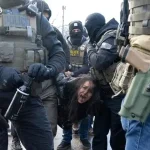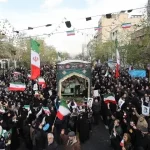Have you heard of a beautiful place, located in the vicinity of the Karakoram and westernmost mighty Himalayan mountain ranges, look closer to it you will see the rivers flowing freely and the tall green trees that are calm. Underneath those calm tall trees and the shady leaves, you will see the face of a little girl, Asifa Bano, dumped in the forest, far away from her home, raped, tortured and dead. Move to the other side you will see Insha Mushtaq, whose face is full of blood coming out of her eyes, being shot by the pellet guns because she was watching a protest outside the window of her home. Look at Farooq Dar who is being used as a shield for the security van. Look at the young Burhan Wani in the encounter with the soldiers and police. Look deep and you will see old Qalandar Khatana, sitting helplessly with his wooden crutches. And you will see an old man sitting in the Srinagar Hospital talking about his trauma that came with the torture by the security force 35 years ago. The closer you look into this valley, the uglier it gets. Just like these people, the valley itself is blind, dumb, deaf, paralyzed and almost dead. Since 1947, Kashmir has been a home to the unheard voices, to the orphaned kids, to the parents whose young son just died, to the girls who have been raped and tortured, to the half-widows who face economic hardships because they are not eligible to get pensions, to the kids of half wives who are traumatized and to the dead bodies of those who are not identifiable and are thrown to the mass graves.
The bloodshed in Jammu and Kashmir started right after the partition of sub-continent in India and Pakistan. It was decided in the partition plan that the places with Muslim majority areas will be included in Pakistan and places with Hindu majority will remain within India. As an independent state, Kashmiris themselves had to decide who they want to join. But the Maharaja of Kashmir played an evil trick and handed over Kashmir to India without the knowledge of its people. Pakistan stands with Kashmir on the moral basis and wants that the Kashmiris must have their right of self-determination, and for this purpose, Pakistan went to war with India three times, 1947-48, 1965 and 1999. United Nations passed several resolutions pressurizing India to conduct a plebiscite and to resolve the issue. But India claims that Kashmir is her integral part and no state has the right to interfere in the internal matter of India.
If India really claims that Kashmir is her internal part then why do the people living in Jammu and Kashmir have different laws than the people living New Dehli? Why do laws like Public Safety Act and Armed Forces Special Power Act only apply to Jammu and Kashmir? The PSA permits arbitrary arrests, detention, and exile. People of all ages in Jammu and Kashmir are arrested for interrogation by the police and security forces under this unlawful act which allows the forces to arrest you even if they do not have any criminal evidence against you. Not only this AFSPA permits the army officials to crackdown the insurgents in the conflicted area, but they may also arrest the suspect without any arrest warrant and may use any kind of force including firepower. These laws violate the basic human rights granted by the International Law and are condemned by the international community variously but India remained silent on this.
In a yearly report published by Jammu and Kashmir Coalition of Civil Society, in 2017 alone, 451 people were killed, out of these 108 were civilians. The country who calls itself one of the biggest democracy kills its own people who raise their voices against the brutal treatment of their soldiers in that area. The soldiers use the pellet guns, which has killed hundreds and injured many. The security officers raid their homes and rape their women. They detain their young kids, and torture them and humiliate them. Because of this treatment by the security forces around 45% out of the total population have symptoms of mental disturbance, out of which 41% have depression, 26% suffer from anxiety and 19% have PTSD as mentioned in the report published by Medecins Sans Frontieres, Doctors without borders in 2015.
The freedom movement in India started in the late 1980’s and escalated after 1990. India blames Pakistan for sponsoring the freedom movement. If the freedom movement in Kashmir was sponsored by Pakistan, they why would hundreds of young Kashmiris join the freedom movement after the death of Burhan Wani? Why the whole society came forward as a reaction to his death? It has been two years since the death of Burhan but the security forces in the valley still fear when the month of October starts. The freedom movement in a place like Kashmir couldn’t be sponsored, but indigenous because no one can remain quite if they are humiliated daily. What Kashmiri’s want is Freedom from the fear of being killed, raped, tortured and kept away from their loved ones. Freedom from the unjust justice, freedom from the brutality of those who are supposed to protect them, freedom to breath without the fear that it might be their last breath. Freedom to say what you want to without the fear that you would be thrown into the torture cell, where you will be treated like an animal and finally killed.
The international community has started taking the Kashmir issue seriously now. For the first time since 1947, the United Nations has published a report in 2018 on the situation of Human Rights in Kashmir and the concerns regarding the general Human Rights in Kashmir and Gilgit-Baltistan. The report strongly condemns the Public Safety Act and AFSPA and asks the government of India to establish a credible, independent and impartial investigation to probe all the killings since 2016. As predicted India rejected this report and called it “Fallacious, tendentious and motivated”, they claim that the report is “overly prejudiced and creates a false narrative”. It is time now that India must hold a plebiscite in Jammu and Kashmir and put an end to the torture and violence on Kashmiris. The only way forward to resolve the Kashmir conflict is including the voice of Kashmiris during the negotiations on Kashmir. The opinion of a resident of Jammu and Kashmir is far more important than anyone from India and Pakistan. Kashmiri’s must be given their right of self-determination and freedom of speech.









Pakistan isi is responsible for all trouble to the people of the indian occupied jammu and kashmir and also responsible for all wrongs to the muslim world